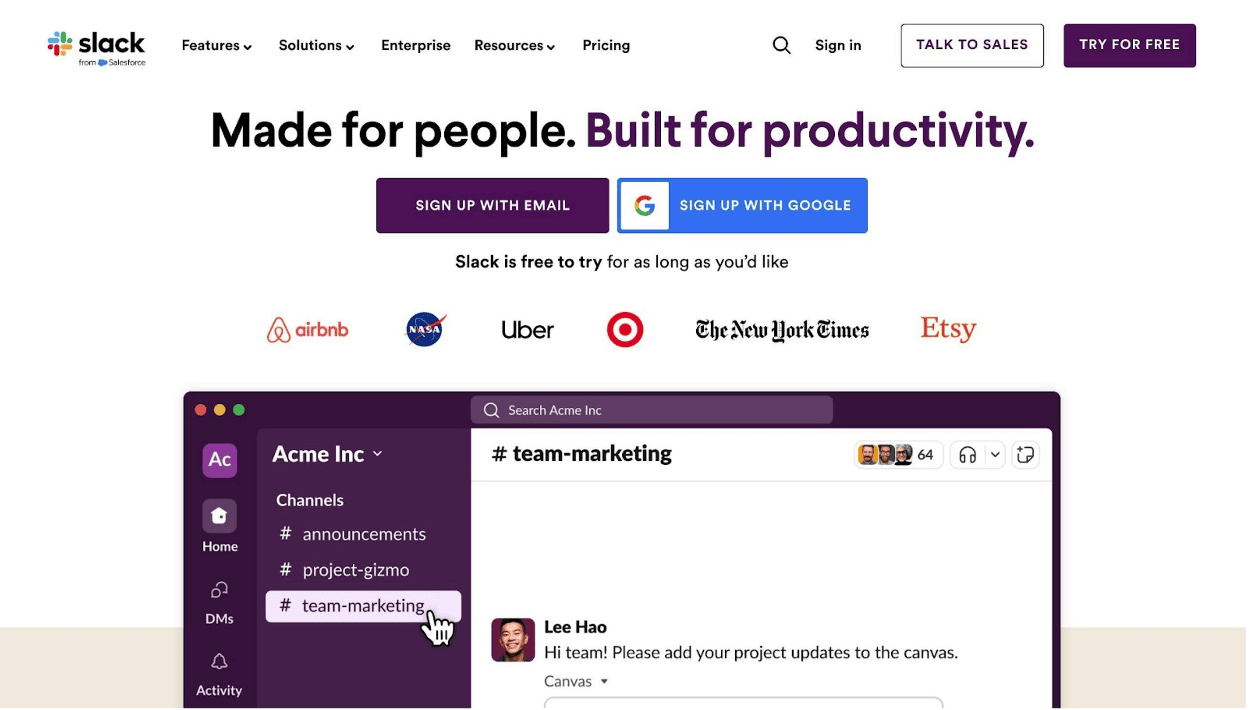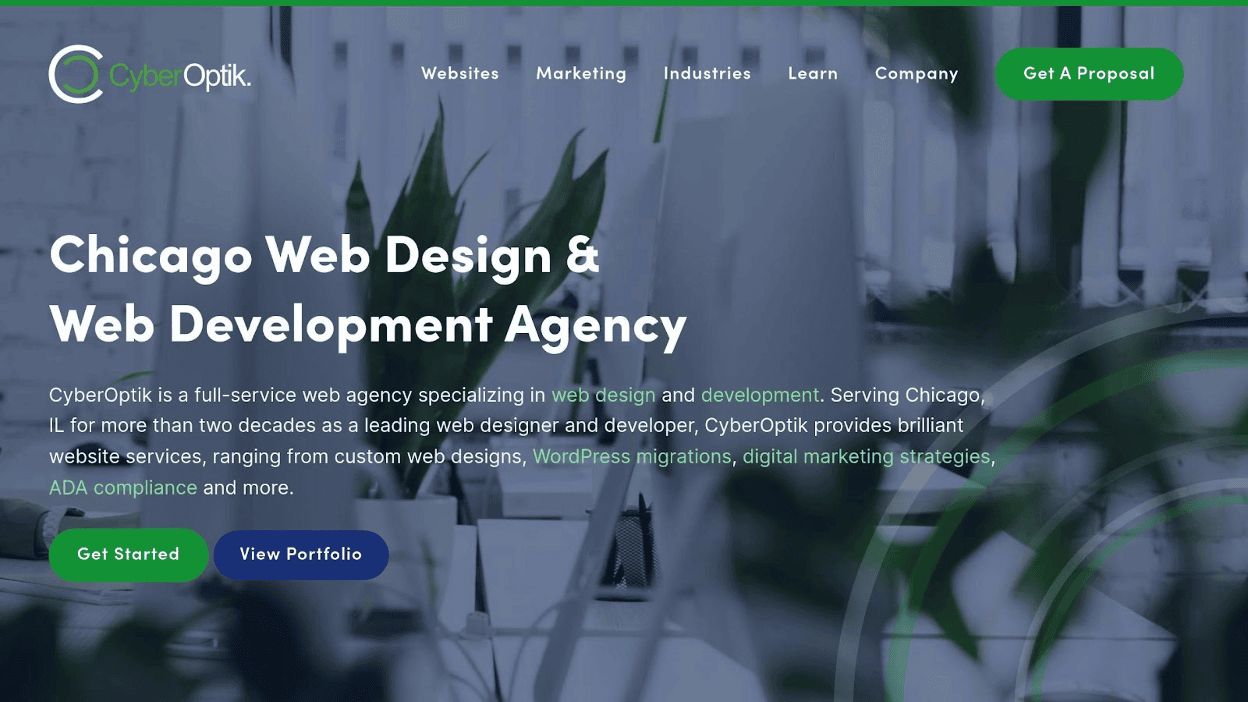Want to write B2B copy that actually sells? Here’s what works in 2025, based on real examples from top companies.
The key to effective B2B copywriting is simple: focus on business results, not fancy words.
Here’s what the best companies do:
- Adobe: Explains complex tech in plain language
- Slack: Uses no-nonsense messaging about productivity
- WordPress: Keeps it simple and action-focused
- CyberOptik: Tackles business problems head-on
- Shopify: Makes e-commerce easy to understand
Quick comparison of effective B2B copy approaches:
| Company | Main Focus | Key Strategy |
|---|---|---|
| Adobe | Tech simplification | Shows clear value and action steps |
| Slack | Productivity | Speaks in plain English to decision-makers |
| WordPress | Website solutions | Front-loads important info |
| CyberOptik | Digital services | Direct problem-solving |
| Shopify | E-commerce | Benefits-first messaging |
The bottom line: Skip the jargon. Focus on:
- Real business results with numbers
- Clear benefits, not just features
- Simple language anyone can understand
- Strong calls to action
- Proof from actual customers
Key stat: 80% of readers don’t read past headlines – so make every word count.
Adobe‘s Copy Approach

Adobe’s B2B copywriting is all about making complex tech easy to understand. They focus on creativity and digital transformation, keeping things professional but not boring.
Let’s look at Adobe Journey Optimizer‘s landing page. Instead of tech jargon, they get straight to the point: real-time personalization for B2B buyers. They talk about what their product does for you, not just its features.
“Business leaders purchasing technology on behalf of their organizations have increasingly high expectations for how they are engaged online, creating a paradigm shift for B2B marketers.” – Amit Ahuja, Senior Vice President, Digital Experience Business at Adobe
Adobe uses three main ideas in their B2B messaging:
- Use inclusive language (like “people” instead of “customers”)
- Show clear value (e.g., “Adobe Dimension helps you create in 3D”)
- Focus on action (tell people exactly what to do next)
They’re not just selling products. By buying CMO.com, Adobe shows they want to be a trusted source of information. They share insights to help businesses deal with digital changes.
Take Adobe Experience Manager Sites. Instead of calling it a “content management system”, they say it lets marketers “create and edit webpages using familiar tools like Microsoft Word.” See how that makes it sound less scary?
Adobe’s mission is to “change the world through digital experiences.” This idea shows up in all their writing, keeping everything consistent but still human-friendly.
2. How Slack Writes for Business

Slack’s B2B copywriting cuts through the noise with a no-nonsense approach. They ditch the tech jargon and speak to decision-makers in plain English.
Their strategy? Focus on fixing real business problems through better communication. Check out their enterprise landing page:
“Made for people. Built for productivity. Connect the right people, find everything you need and automate the rest. That’s work in Slack, your productivity platform”
This message packs a punch because it:
- Puts people first: “Made for people” comes before any tech talk
- Nails the value: It’s all about boosting productivity
- Uses action words: “Connect”, “find”, and “automate” paint a clear picture
Slack’s secret sauce? They talk to C-suite execs without sounding like a textbook. Instead of drowning readers in tech specs, they zero in on what businesses care about: getting more done, faster.
As Slack has grown, their message has evolved to tackle enterprise needs. But they’ve kept things crystal clear. No fancy business lingo here – just straight talk about how Slack can help. This approach bridges the gap between tech features and business value, making it a no-brainer for stakeholders to see how Slack can supercharge their operations.
3. WordPress‘s Business Message Style

WordPress rules 60.8% of the CMS market. How? By nailing simple business talk. They show that B2B copy doesn’t need fancy words to pack a punch.
Why do big names like Sony Music and TechCrunch trust WordPress? Because their message cuts through the noise. They focus on three things: being clear, specific, and action-driven.
“If a new visitor lands on your site and doesn’t instantly know who you are and what you offer, you’ve lost them.”
This idea shapes how WordPress talks to businesses. Let’s break down their website messaging:
| What They Do | How They Do It | Why It Works |
|---|---|---|
| Put key info first | Front-load important stuff | Users only spend 5.59 seconds reading |
| Keep it readable | Short sentences, small paragraphs | 74% of people notice good writing |
| Organize well | Clear headings, easy navigation | 8 in 10 read headlines, 2 in 10 read more |
Real businesses prove this works. Take Rollink, a cool luggage company. They used WordPress to boost their online store. Their copy? It’s all about solving problems, not just listing features.
Or look at SNP Therapeutics. In the tough biotech world, they stand out. How? With clear, action-packed copy that speaks right to their audience’s needs.
WordPress wins because they focus on understanding, not impressing. They say: keep the important stuff at the top and use simple language that clicks with decision-makers. Big players like Spotify’s NewsRoom and PlayStation Blog are following suit.
4. CyberOptik‘s Copy Methods

At CyberOptik we show how B2B copy can drive results without drowning in tech talk. We tackle business challenges head-on while keeping things human.
We like to think that our website copy nails these three key principles that make B2B communication work:
- Direct Problem-Solving: jumping right into client pain points. This speaks to 91% of B2B companies looking for solutions.
- Value-First Messaging: spelling out service benefits before diving into tech details. This approach drives $36 ROI for every $1 spent on communications.
- Human Connection: keeping it conversational, even when talking tech. This boosts engagement with decision-makers.
What makes CyberOptik stand out? We keep things clear, even when services get complex. Instead of bombarding you guys with tech specs, we try to lead with business outcomes. Just check out our web design service pages – it’s all about solutions, not features.
“Speak like a human: Yes, you’re representing a B2B business, but don’t make the mistake of forgetting that your buyer is actually a living, breathing human being with thoughts and emotions.” – Bop Design
This idea shapes everything we do. When we’re talking about WordPress migration or SEO, we endeavor to keep it accessible without losing our pro cred. Here’s how:
- We break down complex services into clear business benefits
- We only use industry terms when really needed
- We focus on measurable outcomes that decision-makers care about
This approach works wonders in the digital services market, where tech jargon often scares people off. By mixing professional know-how with straight talk, you can rely on CyberOptik to show how B2B copy can help you connect technical skills with business value.
5. Shopify‘s Business Writing

Shopify nails B2B communication. They take complex e-commerce ideas and make them easy to understand. Their secret? You don’t need fancy words to explain tech stuff.
Here’s what Shopify does right:
They talk to everyone. Whether you’re just starting out or you’re a pro, Shopify’s got you covered. This makes them feel more like a partner than just another service.
Shopify follows three main rules:
- Benefits First
They don’t bore you with tech specs. Instead, they show how their platform can help your business grow. It’s all about what you get, not what the software does.
- Same Voice, Always
No matter where you see Shopify’s message, it sounds the same. They’re professional but friendly. This builds trust with businesses.
- Stories, Not Specs
Instead of drowning you in technical details, they tell stories about business success. It’s way more interesting.
“We want to be a household name people associate with entrepreneurship”, says Jeff Weiser, Shopify’s CMO.
Shopify stands out because they keep things clear, even when talking about complex e-commerce stuff. How do they do it?
- They explain how features help your business
- They use everyday words for tech concepts
- They focus on what you can achieve, not how the software works
- They sound the same everywhere you see them
Shopify shows that B2B writing doesn’t need to be full of jargon to sound smart. By keeping things clear and focusing on benefits, they connect with business owners while still coming across as experts.
B2B copywriting tips and examples to spark inspiration
https://youtu.be/1xro1n8kz3Q?si=BG3aon-D_ECGfYf6
How to Write Better B2B Copy
Want to create B2B copy that actually works? Let’s dive into strategies that get results.
First up: focus on benefits. Unbounce saw a 90% jump in conversions by tweaking their CTA from “Start your free 30-day trial” to “Start my free 30-day trial”. Why? It’s more personal and action-driven.
Numbers speak louder than buzzwords. Forget “industry-leading” – show impact with data:
| Copy Element | Weak | Strong |
|---|---|---|
| Value Prop | "Advanced analytics solution" | "Reduce reporting time by 75%" |
| Feature | "AI-powered insights" | "Find revenue opportunities in 24 hours, not 2 weeks" |
| Social Proof | "Trusted by many companies' | "Used by 200+ Fortune 500 firms, including Adobe and Microsoft" |
Your brand voice matters. As Scribe National puts it:
“Copywriting lands sales. Great visual branding is important, of course, but words ultimately position your B2B tech company to your audience and articulate the value of your offerings.”
Solve problems, don’t list features. Instead of “cloud-based storage”, try “access critical files instantly from anywhere, even during outages.”
Three keys to killer B2B copy:
- Customer Proof
Share real success stories and data from clients.
- Clear Benefits
Spell out how you improve business outcomes.
- Action-Oriented Language
Guide readers to the next step with strong CTAs.
Keep it consistent across platforms. Your website, emails, and white papers should all feel like they’re coming from the same trusted source.
Translate tech-speak into business outcomes. Don’t just say “256-bit encryption” – explain how it “protects sensitive data and ensures regulatory compliance.”
The best B2B copy blends expertise with conversation. Think of it as a focused business chat, not a stuffy presentation. Keep it clear and accurate, but ditch the jargon.
Side-by-Side Look at Copy Examples
Let’s check out how different B2B companies write their copy. We’ll look at real examples that show what works well.
| Copy Element | Old Way | New Way That Works |
|---|---|---|
| Value Proposition | "Industry-leading software solutions for enterprise businesses" | "Cut reporting time by 75% while increasing accuracy - trusted by 200+ Fortune 500 companies" |
| Product Description | "Cloud-based enterprise resource planning system with advanced features" | "Connect sales, inventory, and finance in real-time. Spot opportunities faster and streamline operations across departments" |
| Call-to-Action | "Request Demo" | "See Your Potential ROI in 2 Minutes" |
CyberOptik shows how to write about technical services in a way that focuses on benefits. Instead of just saying “WordPress Migration”, they say “Seamless WordPress Migration with Zero Downtime.” This speaks directly to what businesses care about.
B2B copy has changed a lot. It’s now more conversational and focused on results. Look at these real examples of how headlines have changed:
| Company Focus | Old Headline | New Headline |
|---|---|---|
| Data Analytics | "Advanced Business Intelligence Platform" | "Transform Raw Data into Revenue in 48 Hours" |
| Security Software | "Next-Generation Cybersecurity Solution" | "Prevent Data Breaches Before They Happen - Save $3.2M in Potential Losses" |
| Marketing Tools | "Comprehensive Marketing Automation" | "Double Your Lead Quality While Cutting Follow-up Time by 60%" |
The big difference? Being specific and focusing on outcomes. Good B2B copy now talks about real results, not just tech specs. Instead of listing features, smart companies show how much money you can save or how much faster you can work.
Notice how good B2B copy stays professional but sounds more like a conversation. It connects what the tech can do with how it helps your business. And it uses real numbers to back up claims, not just big words that don’t mean much.
Key Points to Remember
After looking at successful B2B copywriting examples, we’ve spotted some strategies that really work. Companies are moving away from tech-speak and focusing on how they can help customers.
Show Real Results
The best B2B copy doesn’t just make vague promises. It shows exactly how a product or service can help. Take HubSpot, for example. They don’t just say they’ll “grow your business.” Instead, they show how their software can boost your numbers without sacrificing quality.
Use Social Proof
Numbers talk. Shopify gets this right. They don’t just say they’re popular. They tell you straight up: “trusted by over 1,000,000 businesses worldwide.” That’s a number that makes you sit up and take notice.
Here’s how B2B copy has changed:
| Old Way | New Way |
|---|---|
| Talk about tech specs | Show business results |
| Make general claims | Use specific numbers and case studies |
| Use fancy, complex words | Keep it professional but easy to read |
| Ask people to "contact us" | Invite people to see the value |
Turn Features into Benefits
MailChimp doesn’t just list what their email tool can do. They show how it can make you money. They don’t say, “We have email automation.” They say, “Turn your emails into a revenue stream.” See the difference?
Use Data to Convince
B2B buyers love numbers. They want proof before they buy. So, good B2B copy uses stats and data to make its case.
Guide the Reader
Every piece of B2B copy should lead somewhere. Maybe it’s to download a report or book a demo. Whatever it is, make sure your copy points the way clearly.
FAQs
What is B2B copywriting?
B2B copywriting is all about creating content for businesses selling to other businesses. It’s a whole different ball game compared to B2C (business-to-consumer) writing.
Here’s the deal: B2B copy tackles specific business problems and talks directly to the pros making the decisions. It’s not about tugging at heartstrings – it’s about showing real value and ROI.
Let’s break it down:
| B2B Copywriting | B2C Copywriting |
|---|---|
| All about business value & ROI | Focuses on personal benefits & emotions |
| Uses pro-level, sometimes techy language | Keeps it casual and chatty |
| Deals with longer decision processes, multiple people involved | Targets quicker decisions, usually by individuals |
| Produces stuff like white papers and case studies | Creates product descriptions and ads |
“B2B copywriting should guide the reader toward a specific action. Whether it’s downloading a white paper, scheduling a demo, or making a purchase, your calls to action should be clear, compelling, and aligned with the objectives of your B2B audience.” – Awware
Want to see B2B copywriting in action? Check out IBM’s cloud services page. They’re not trying to pull your heartstrings. Instead, they’re talking about things that matter to businesses – like how scalable and secure their services are. It’s all about addressing real operational issues in a way that speaks to the tech decision-makers.
When you’re writing B2B copy, keep these things in mind:
- Back up your claims with cold, hard data
- Show how you solve business problems
- Keep it professional, but don’t make it a snooze-fest
- Talk about specific outcomes that can be measured



